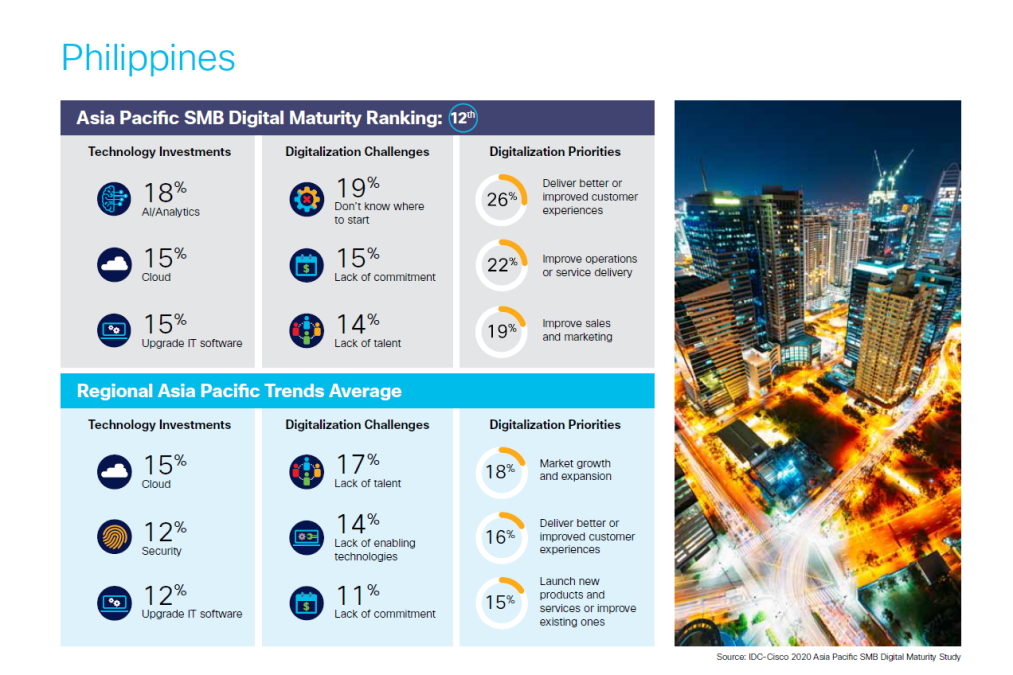The digitalization of the country’s Small Medium Businesses (SMBs) could add somewhere between USD 26 to USD 28 billion (about PHP 1.17 to PHP 1.36 trillion) to the Philippines GDP by 2024 to help in recovery post-COVID-19, according to the 2020 Asia Pacific SMB Digital Maturity Study.
The study, commissioned by Cisco and conducted by International Data Corporation (IDC), maps out the digital maturity of businesses in the Asia-Pacific region. According to the study, Digital Maturity has four stages, (1) Digital Indifference, (2) Digital Observer, (3) Digital Challenger, and (4) Digital Native. The study finds that the more digitally mature a company is, the more benefits in revenue and productivity it enjoys.

Now on its second year, the study found that 73% of the country’s SMBs are still in the Digital Indifference stage, but are moving closer to the Digital Observer stage. According to the study, customer experience and service delivery are the main priorities as well as the main drivers for business digitalization. 26% of SMB respondents aim to improve customer experience, 22% aim to improve service delivery, and 19% aim to improve marketing and sales as the reason for digitalization.
These are positive and significant development since SMBs account for 99.6% of all businesses in the country, 62% of the country’s total employment, and contribute 36% of the total GDP. As such the resiliency, agility, and digital transformation capabilities of SMBs will play an important role in the country’s post-COVID-19 economic recovery.
“The SMB sector has been among the hardest hit by the COVID-19 pandemic. However, the country’s SMBs have shown great resilience, and have leveraged technology to continue to operate and serve their customers during the period. As the Philippines continues to overcome the current situation, and consumer and business activity start to pick up, digital transformation of SMBs will play a pivotal role in their recovery and contribute to the country’s overall economic growth. At Cisco, we are committed to work with SMBs to help them emerge stronger with the right digital solutions and strategy,” said Karrie Ilagan, managing director for Cisco Philippines.

Additionally, the study found that AI/Analytics (18%) to be the top technology investment priority of SMBs in the country, followed by Cloud Technologies (15%), and purchasing or upgrading IT infrastructure software (11%).
However, SMBs also face challenges in adopting digital strategies. According to the respondents, lack of budget or commitment from management (15%) is the biggest challenge they face, followed by the shortage of skills (14%). Many also point at cultural resistance to change (12%) as a challenge, as the digitalization of products and services require a substantial shift from long-standing practices.
“SMBs are the backbone of ASEAN economies, accounting for over 85% of total business establishments and making up the main contributions to private sector employment in the region. While they are currently facing the biggest challenges to their operations, they also have an unprecedented opportunity to accelerate their digital transformation. Technology can not only help solve some of their key challenges and revitalize their operations but also help them sustain their growth in the long term,” said Raz Mohamad, director small business and commercial for ASEAN at Cisco.
“However, for SMBs to fully leverage technology, all stakeholders need to play a role. The government is already taking the lead and has introduced a range of measures to help Philippine SMBs on their digital journey. At Cisco, we are proud to be playing our part. On the technology front, we have launched a series of curated products and solutions specifically for the SMB sector under the Cisco Designed portfolio and introduced 0% financing for SMB customers in the country. From a talent perspective, the Cisco Networking Academy has trained over 428,000 students in the Philippines in various ICT skills for over two decades,” he added.
Besides the Philippines, the study found that nearly 70% of SMBs in Asia Pacific are accelerating the digitalization of their businesses because of COVID-19. Among the respondents, 86% say they believe digitalization will help develop future resilience against crises like COVID-19.
Within Asia Pacific, SMBs in Singapore, Japan, and New Zealand continue to lead the Digital Observer group with no changes in their ranking compared to 2019. However, mainland China, Taiwan, and Thailand surpassed Korea, Hong Kong, and Malaysia respectively. Other notable progress comes from Indonesia and Vietnam.
The 2020 Asia Pacific SMB Digital Maturity Study gathered and analyzed data from over 1,400 SMBs across 14 countries in APAC to assess the challenges and opportunities the companies face in their digital transformation. These countries are Australia, China, Hong Kong, India, Indonesia, Japan, Malaysia, New Zealand, Philippines, Singapore, South Korea, Thailand, and Vietnam.
